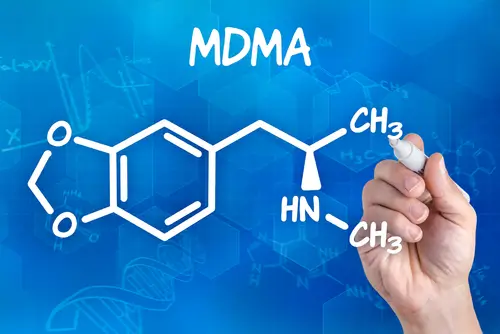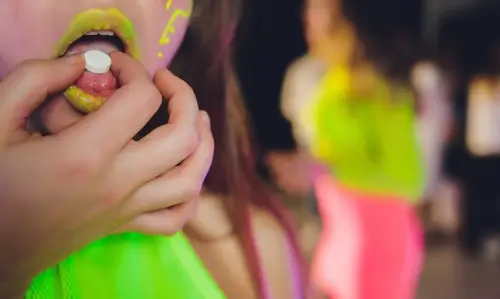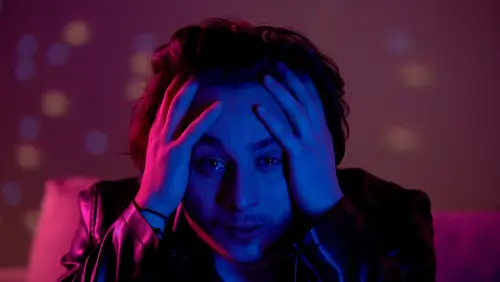If you’re unsure if you or someone you know is addicted to molly, this article is for you. Molly has intense effects that can last hours and leave users in a state of euphoria and excitement until they suddenly crash.
Some people may not realize their molly use is excessive because they think they only use it at parties, raves, or clubs, even though they go to these events more often than others.
This article goes into deeper detail about this synthetic drug, if it’s addictive, and eight signs that you might be addicted to molly.
What is Molly?
Molly, also known as MDMA and Ecstasy, is a popular street drug often associated with parties, clubs, and music festivals. When people take molly, they can experience intense euphoria, increased energy, a sense of connection with others, and heightened awareness. It became even more widespread in recent years, influenced by its presence in music and pop culture.
The drug is so popular that in 2021, just a few years after dozens of songs were released about molly use, 20 million people over 18 reported using it in their lifetime.
Molly primarily affects three neurotransmitters in the brain:
- Serotonin: Molly enhances the effects of serotonin, leading to various outcomes such as euphoria, empathy, and increased sociability. It may also impact sexual arousal, sleep patterns, and appetite.
- Dopamine: Molly triggers an increase in dopamine levels, resulting in feelings of pleasure, euphoria, and heightened energy.
- Norepinephrine: Molly raises norepinephrine levels, producing stimulant effects like increased heart rate and blood pressure. However, these effects can also lead to potentially dangerous side effects.
Read more: What Are The Dangers Of Mixing Molly And Alcohol?

Why Is It Called “Molly?”
Molly, short for ‘molecular,’ is a form of 3,4-methylenedioxymethamphetamine that usually comes as a crystalline powder or in capsule form. Some people mistakenly believe that molly is pure and “safe” and doesn’t contain pollutants or contaminants often found in ecstasy. However, studies conducted by the U.S. Drug Enforcement Administration (DEA) have shown that drugs sold as molly frequently contain other substances and may not even contain any MDMA.
For instance, researchers from Washington State and Florida reported in 2013 that substances sold as molly contained methylone, a synthetic stimulant commonly found in ‘bath salts.’ In 2015, the British Journal of Pharmacology reported that ethylone, another synthetic stimulant similar to methylone but with slight differences in its effects on the brain, replaced methylone as the primary substance marketed as molly.
The National Institute on Drug Abuse (NIDA) reported that the powder and tablet forms of MDMA initially contained around 30-40% of MDMA but now appear less pure than ever, replaced with ketamine, caffeine, and ephedrine.

Is Molly Addictive?
Current research on whether molly is addictive doesn’t give a yes or no answer. That’s mostly because there are differences between building a tolerance to molly, depending on it to feel physical or emotional effects, and neurologically craving it.
- Tolerance: Some individuals develop tolerance to drugs, including molly or ecstasy. This means they require higher doses or more frequent use to achieve the same effects they initially experienced when they started using the drug.
- Dependence and Withdrawal: When the body becomes dependent on a drug like molly, suddenly quitting can lead to physical and emotional withdrawal symptoms.
- Substance Use Disorder: Substance use disorder involves dependence and a complex brain-reward system, with dopamine playing a significant role. In some individuals, it also triggers strong cravings for molly. Experiments have shown that animals are willing to self-administer MDMA, indicating its potential for abuse, although to a lesser extent than other drugs like cocaine.
The American Psychiatric Association labels an addiction to molly as a hallucinogen use disorder, but others refer to it as an ecstasy use or MDMA use disorder.
Read more about combining molly with other drugs in: What Is Polysubstance Abuse?
8 Signs You’re Addicted To Molly
Depending on molly to feel excited or energized and building a tolerance to the point where you’re taking more than usual, can be easy to spot if you know more about the drug. But developing an ecstasy addiction can be hard to spot. Here are eight warning signs you might be addicted to molly.
- Noticeable change in personality or behavior, exhibiting unusually friendly or erratic behaviors.
- Inability to perform daily routines without the use of MDMA.
- Strong urges or compulsion to use molly despite noticing negative effects.
- Life may revolve around molly, including frequently asking friends or strangers to buy or use some, engaging in dishonesty, deception, or theft to obtain more molly if needed.
- Prioritizing molly over other commitments, neglecting work and social life. Individuals may disregard old friendships in favor of new ones who support drug use.
- Experiencing withdrawal symptoms like mood swings, depression, and anxiety.
- Unusually high energy levels and feeling the need to party more than usual.
- Trouble with sleep and frequent exhaustion during the day.

Long-Term Effects Of Molly Use
Several reports indicate that young adult and adolescent brains are still developing during their early 20s. The long-term effects of MDMA pose significant risks and inhibit important brain and cognitive growth. Long-term effects include:
- Lingering, blurred vision, dizziness, confusion, and paranoia
- Depression
- Memory loss
- Lack of focus, awareness, or attention
- Insomnia
- Increased anxiety and impulsiveness, like restless legs
- Irritability and decreased libido
Other negative effects include:
- high blood pressure
- potentially life-threatening increase in body temperature
- Loss of appetite
- Chills or sweating and dehydration
- Headaches and nausea

Molly Addiction Treatment In Los Angeles
If any of these signs of molly addiction stick out to you, whether you notice them in yourself or a loved one, contact Launch Centers in Los Angeles. Our addiction treatment programs can help individuals get their lives back on track after falling into the pitfalls of ecstasy abuse and other designer party drugs. Our therapy methods, like cognitive behavioral therapy, can help you explore the underlying reasons behind substance abuse and find alternative ways to feel positive and mentally healthy.





